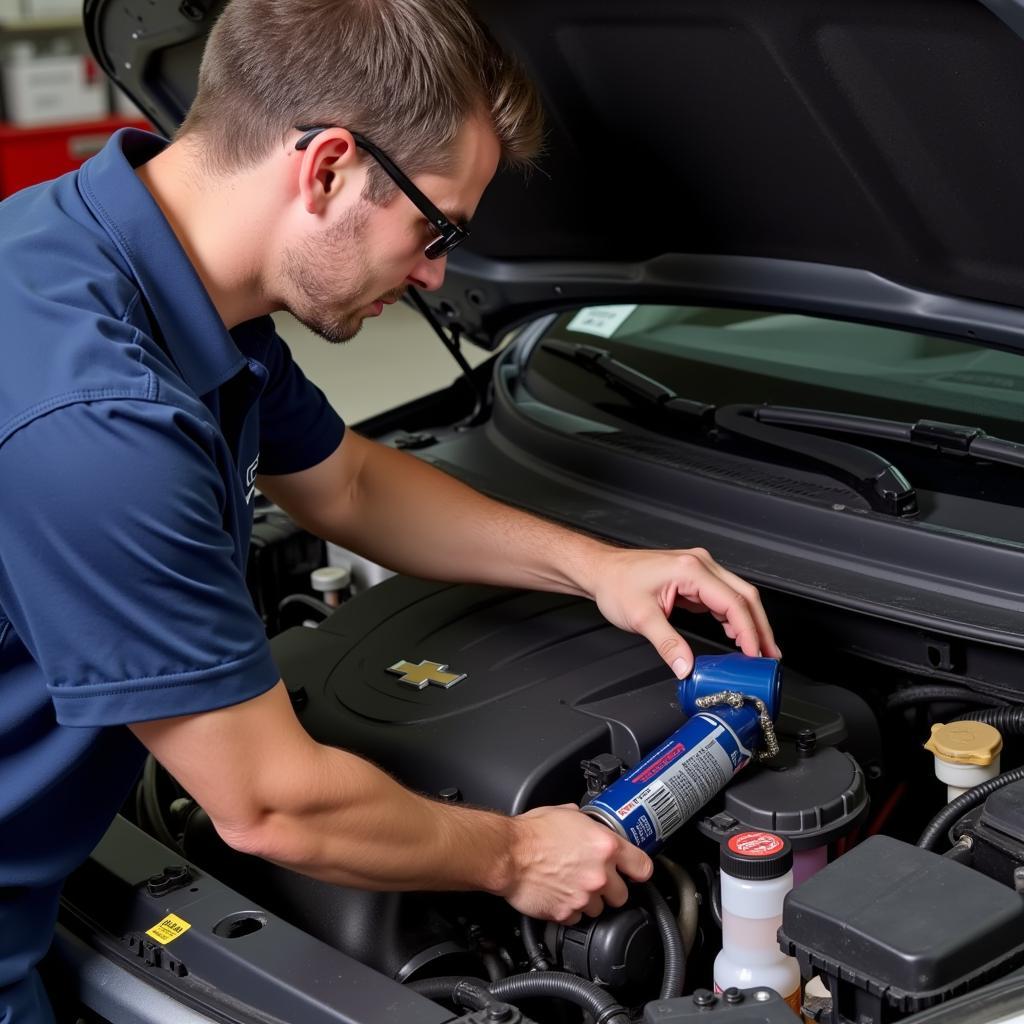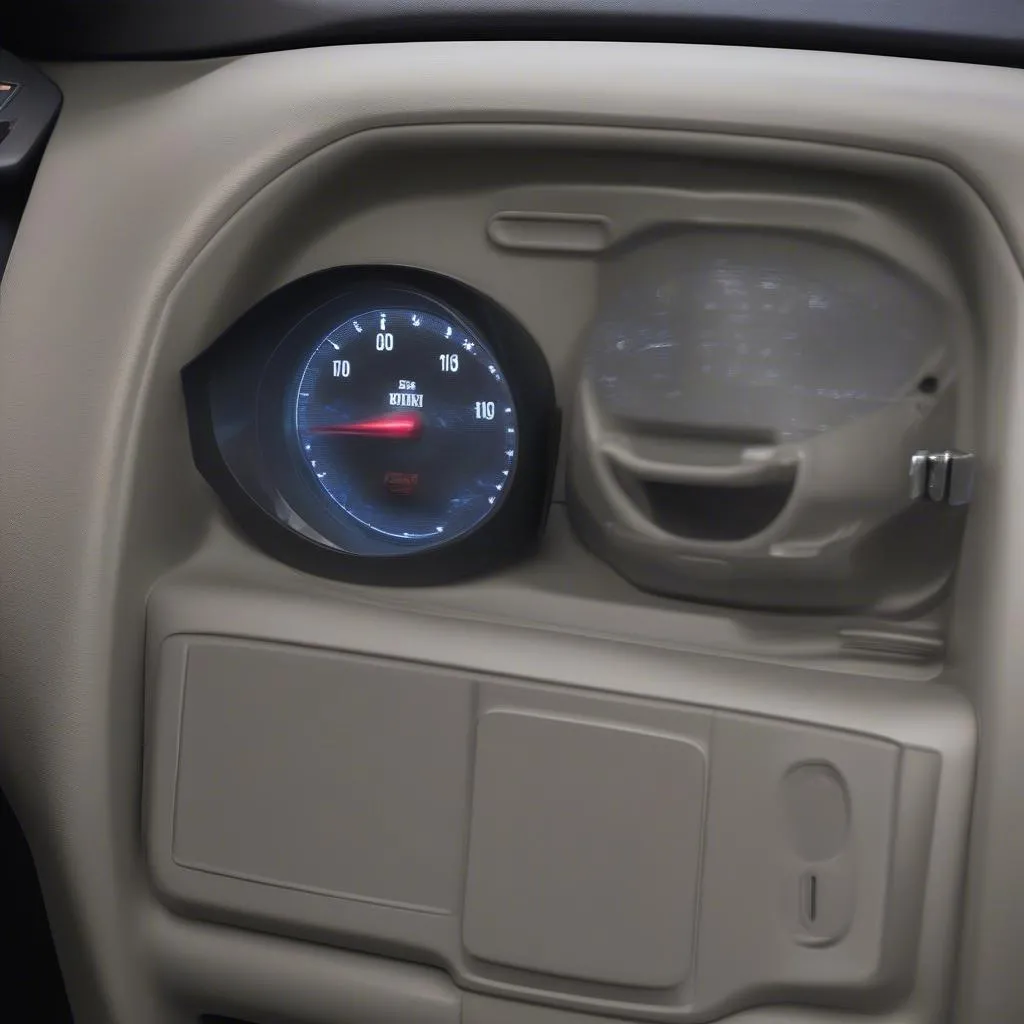The Chevy Cobalt is a popular compact car known for its fuel efficiency and sporty handling. However, like any vehicle, it can experience issues, and one common problem is the illumination of the brake warning light. This light is part of your car’s safety system and serves as a crucial indicator of potential brake system problems. If your Chevy Cobalt’s brake warning light comes on, it’s essential to address the issue promptly to ensure your safety and prevent further damage.
Understanding Your Chevy Cobalt’s Brake Warning Light
The brake warning light on your dashboard can illuminate for several reasons, some more serious than others. While a simple issue like a disengaged parking brake can trigger the light, it can also signal a critical problem within your braking system.
Here are a few common reasons why your Chevy Cobalt’s brake warning light might be on:
- Low Brake Fluid: The most common culprit is low brake fluid level. Your brake system relies on hydraulic pressure to function correctly, and low fluid levels can significantly impact braking performance.
- Worn Brake Pads: Brake pads naturally wear down over time. When they reach a certain thinness, your brake warning light will activate to remind you to replace them.
- Brake Fluid Leak: A leak in your brake lines, calipers, or wheel cylinders can lead to a sudden or gradual loss of brake fluid, triggering the warning light.
- Faulty Brake Light Switch: The brake light switch is responsible for activating your brake lights when you press the pedal. A malfunctioning switch can cause the brake warning light to stay on.
- ABS Issue: If your Chevy Cobalt is equipped with an Anti-lock Braking System (ABS), a problem with this system can also illuminate the brake warning light.
Troubleshooting the Brake Warning Light on a Chevy Cobalt
Before heading to a mechanic, you can perform some basic troubleshooting steps to try and identify the cause of the problem:
- Check Your Parking Brake: Ensure your parking brake is fully released. It might seem obvious, but sometimes the simplest solution is the right one.
- Inspect Your Brake Fluid Level: Park your car on a level surface, open the hood, and locate the brake fluid reservoir. The reservoir will have a “MIN” and “MAX” marking. If the fluid level is below the “MIN” mark, you’ll need to add more brake fluid. Important: Only use the type of brake fluid specified in your owner’s manual.
- Visually Inspect Your Brake System: Carefully look for any signs of leaks in your brake lines, hoses, calipers, and wheel cylinders. A brake fluid leak will appear as a wet, oily spot. Caution: Brake fluid is corrosive, so avoid direct contact with your skin or eyes.
- Check Your Brake Lights: Have someone press the brake pedal while you check if all brake lights are functioning correctly. If one or more brake lights aren’t working, the brake light switch might be faulty.
 Mechanic Checking Brake Fluid in a Chevy Cobalt
Mechanic Checking Brake Fluid in a Chevy Cobalt
When to Consult a Professional
If your brake warning light remains illuminated after performing these checks, it’s crucial to consult a qualified mechanic immediately. Driving with a potential brake issue can be extremely dangerous. A professional mechanic can diagnose the problem accurately using advanced diagnostic tools and recommend the necessary repairs.
Chevy Cobalt Brake Fluid Warning: What to Do
A cobalt brake fluid warning specifically indicates a problem with your brake fluid system. Here are some additional steps to take if you encounter this specific warning:
- Do Not Drive: A brake fluid warning signifies a potentially serious issue. Continuing to drive could lead to brake failure.
- Check for Leaks: As mentioned earlier, carefully inspect your brake system for leaks. If you notice a leak, it’s crucial to address it before adding any brake fluid.
- Consider Roadside Assistance: If you’re uncomfortable checking the brake fluid yourself or suspect a leak, it’s best to call for roadside assistance to tow your vehicle to a trusted mechanic.
Preventing Future Brake Problems
Regular maintenance is key to preventing brake problems in your Chevy Cobalt:
- Follow Scheduled Maintenance: Adhere to the recommended maintenance schedule in your owner’s manual.
- Inspect Your Brakes Regularly: At least once a month, give your brakes a visual inspection.
- Listen for Unusual Noises: Pay attention to any unusual noises like squeaking, grinding, or scraping when applying the brakes.
Expert Insight
“Many drivers underestimate the importance of brake fluid,” says John Smith, a certified automotive technician with over 20 years of experience. “Brake fluid is hygroscopic, meaning it absorbs moisture over time. This moisture contamination can reduce braking performance and damage brake components. It’s crucial to have your brake fluid flushed and replaced regularly to maintain optimal braking performance.”
Conclusion
A glowing brake warning light in your Chevy Cobalt is a serious concern that shouldn’t be ignored. By understanding the potential causes and following the recommended troubleshooting steps, you can take the necessary measures to ensure your safety on the road. Remember, if you’re unsure about anything related to your car’s braking system, it’s always best to err on the side of caution and consult a qualified mechanic. Regular brake maintenance and timely repairs will go a long way in preventing accidents and keeping your Chevy Cobalt running smoothly for years to come.
FAQs
Q: Can I drive my Chevy Cobalt with the brake warning light on?
A: It’s strongly advised not to drive with the brake warning light on. Doing so could be dangerous.
Q: How much does it cost to fix a Chevy Cobalt brake light problem?
A: The cost varies greatly depending on the underlying issue. A simple brake fluid top-up will be inexpensive, while a complete brake system repair can be costly.
Q: How often should I replace my Chevy Cobalt’s brake pads?
A: Brake pad lifespan varies depending on driving habits and conditions. It’s best to consult your owner’s manual or a trusted mechanic to determine the recommended replacement interval for your vehicle.
Q: What is the difference between a brake fluid warning chevy cobalt and a regular brake warning light?
A: While both indicate a brake system problem, a brake fluid warning specifically points to an issue with the brake fluid level or a potential leak.
Q: Can I add any type of brake fluid to my Chevy Cobalt?
A: No, it’s crucial to use the type of brake fluid specified in your owner’s manual. Using the wrong fluid can damage your brake system.

